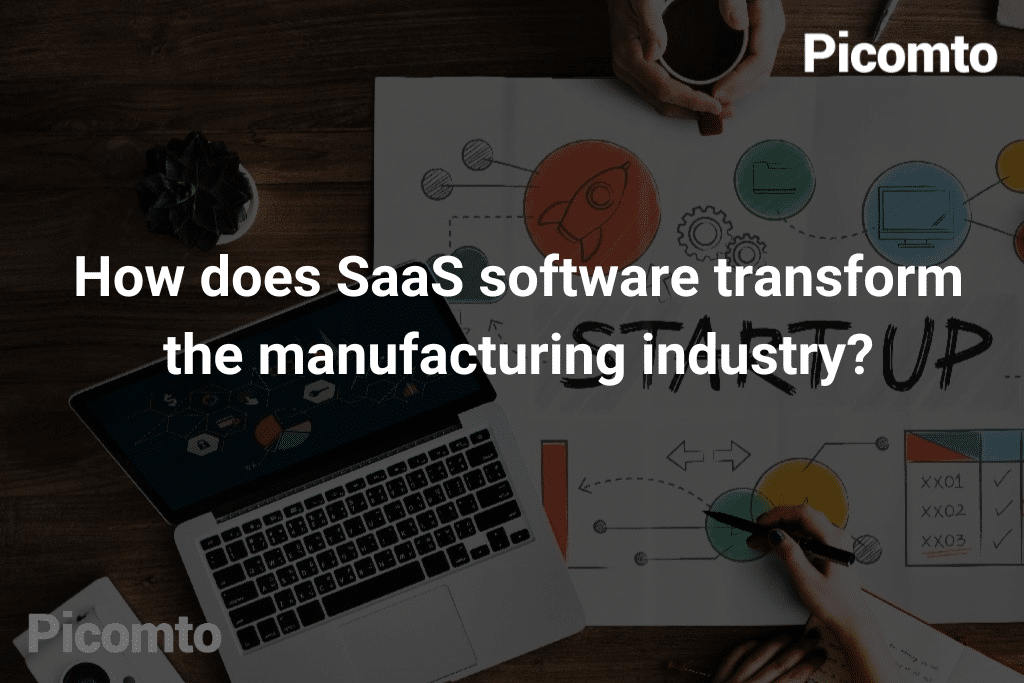
Industry 4.0 is based on innovative tools that streamline work, make it easier, and optimize the functioning of the production chain. Manufacturing SaaS software is one of these tools. It was introduced into the plant to allow manufacturers to benefit from its disparate advantages. Let’s discover in detail everything about SaaS software and its efficiencies.
What is manufacturing SaaS software?
The term SaaS software consists of two words: software and SaaS. Software can be defined as a computer program that provides a series of instructions to control the operation of a machine. SaaS, in English, means Software As A Service.
Manufacturing SaaS software differs from traditional software in that it does not have to be installed on a machine for it to work. It is, in fact, hosted in the cloud and accessible from any connected device.
Thus, the SaaS software is automated and can be accessed from anywhere, it is not necessary to be on the premises to access the data.
What are the benefits of integrating and using manufacturing SaaS software?
Reduced operating costs
Access to the software package is by subscription (usually annual or monthly), however, the use of traditional software requires the acquisition of a license. In addition, the deployment of the latter requires maintenance costs and budgeting to be planned, while the maintenance and updating of the SaaS software is done automatically by its agile designers. Hence the economic interest of using SaaS in the industry to improve profitability.
Accessibility and mobility
To access SaaS software, simply connect to the Internet via a multimedia device, whether it is a PC or a smartphone. This reinforces the concept of data mobility, which is an advantage of the digital transformation of the industry. In fact, the software package allows the remote workshop to be connected to the same database to ensure better communication of information and traceability.
Data Security
Since it is hosted in the cloud, Manufacturing SaaS is protected from any disaster that can reach the factory. Thus, industrial data are secure, which ensures the continuity of production and increases productivity.
Flexible use
SaaS software allows users to be added as needed. This provides a high degree of flexibility in the use and access to data. In fact, it is even possible to upgrade the subscription to access other customizable features and keep up with the company’s changing needs.
A better quality service
The quality of service is seamlessly ensured by updates made by the creators of the SaaS software. Industrial companies should not be involved in updating the software and solving problems related to its use. In fact, SaaS software is supported by after-sales service and problem resolution support teams.
Possible interconnection
SaaS software also allows for better interconnection. This makes it easier for companies to communicate data between an ERP and a CMMS…
Some examples of SaaS software
SaaS software is numerous and configurable, and its functionalities vary considerably. Here are the software packages most used by industrial companies:
CMMS
Computer Assisted Maintenance Management, it is a software that allows the company to manage its maintenance, planning, interventions, equipment, maintenance solutions, etc…
ERP
Enterprise Resource Planning: it is an integrated management software package (ERP) that allows the company to organize its resources and processes (HR management, accounting management, etc.).
– Project management software packages that allow you to share project planning information and inventory software packages that allow you to manage your company’s inventory in real time.
CRM
Costumer Relationship Management: it is a customer relationship management software that allows the company to organize its customer files, organize deliveries and sales actions.
New SaaS software for manufacturers
There is also an emergence of new SaaS software for manufacturers that has developed through digital transformation and industry 4.0.
Among them are Digital Work Instructions software, such as the one we are adopting and developing. They make it possible to digitize thus simplify operational documentation, work instructions and data collection to improve the company’s overall processes and performance and ensure its smart manufacturing.




Leave A Comment